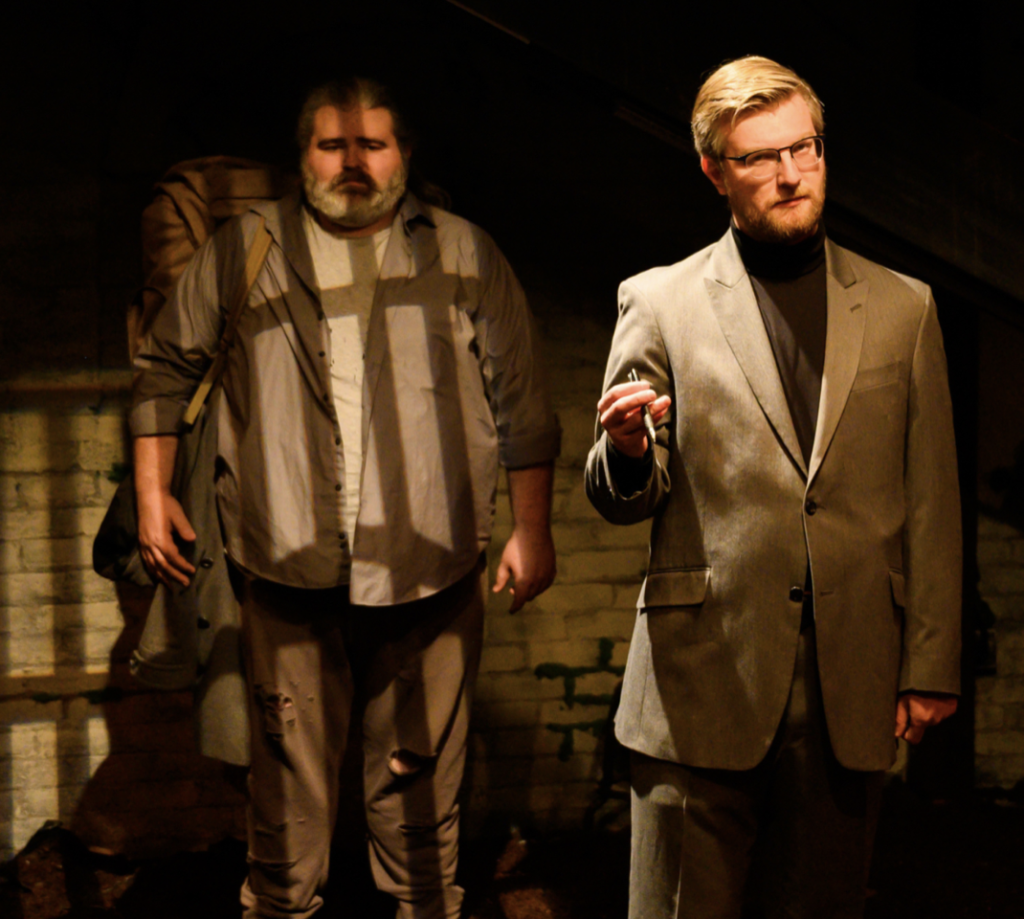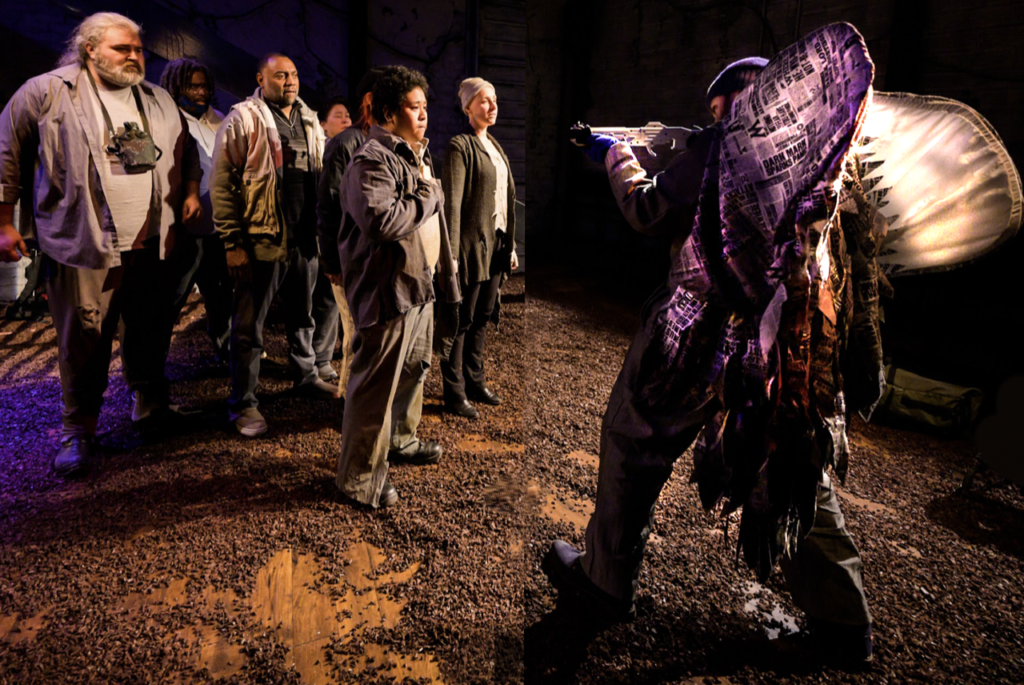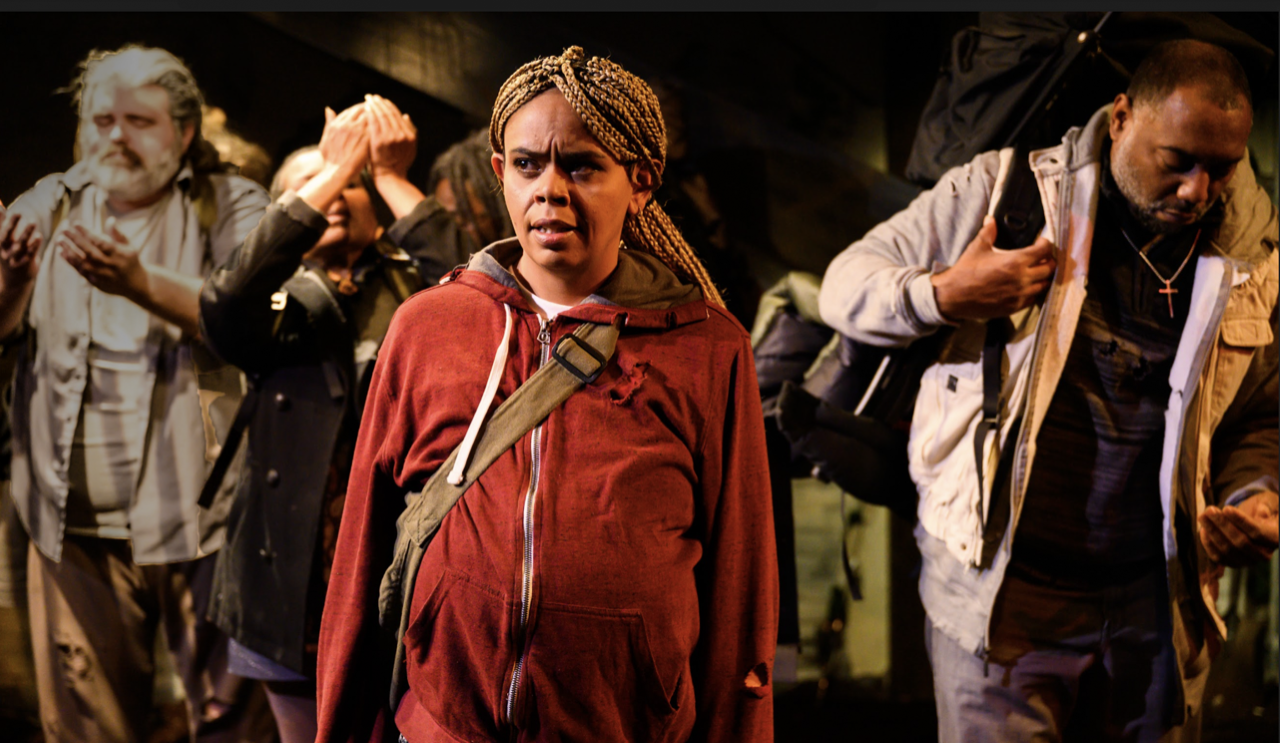By Susan Dunn
In a reverse metaphor from Steinbeck’s Grapes of Wrath, in Exodus to Eden, a company of wanderers travels from California, which climate change has rendered a dust-bowl, to Oklahoma, which offers the possibility of affordable housing and hope for new life.
The always-unique Oakland Theater Project goes to the mat in this sprawling three-hour new production which seeks to save us from our current gods of capitalism and power. In a promo video, Arielle Powell, who plays the lead role Miriam, shares that this new play, written and directed by Michael Socrates Moran, is about this theater company coming together to try to right our seriously-wronged community.
According to The Man: “Exodus isn’t about ‘The People.’ It’s about gods. Gods fighting over a nation’s economy.”
What is wrong? That’s not always clear in the mix of character groups, historical and theatrical allusions, fuzzy transitions between dream sequences and reality, and above all, the difficulties with everyday communications across our own community. What’s wrong is conveyed to us from harangues, from bodily reactions, from mysteries, from the weather, and from technology. These elements arrive helter-skelter. Sorting this out through the play is the audience’s challenge.
The prologue announces the end of history, the end of the Cold War, and the takeover by capitalism and power. Embodied by “The Man,” we are lectured that the world is now ruled by contracts, by transactions to individuals. The social covenant is the glue which binds our communities across all different peoples. And that covenant is now dissipated by drugs.

As technology advances our lives, it also destroys our planet. In a brilliant touch, a guardian angel shadows and protects The Man with a ray gun which zaps our cares for the planet by shooting off constant TV announcements of trouble. Readily available drugs help the rest of us chill out, like soma in 1984.
For the wanderers, life is a prison boxing them in. Their journey, the search for home, for house, for safety and sustenance, is to find out how to get out of that prison. As they face enormous odds, most will not survive.

This panorama of issues is fitted out with fascinating costumes, projections, sound effects and props which help to punctuate and sort out the many themes and characters. However, the road forward through the central character of Miriam, is not easily understood. She has dodged a deal with the devil throughout the play.
What she carries forward with her new child is up to our imaginations. See this play for the scope, the passion and occasional magic of the work, and decide which world you need to live in.
-30-
 Since arriving in California from New York in 1991, Susan Dunn has been on the executive boards of Hillbarn Theatre, Altarena Playhouse, Berkeley Playhouse, Virago Theatre and Island City Opera, where she is a development director and stage manager.
Since arriving in California from New York in 1991, Susan Dunn has been on the executive boards of Hillbarn Theatre, Altarena Playhouse, Berkeley Playhouse, Virago Theatre and Island City Opera, where she is a development director and stage manager.
An enthusiastic advocate for new productions and local playwrights, she is a voting member of the SF Bay Area Theatre Critics Circle, and a recipient of a 2015 Alameda County Arts Leadership Award. Contact: susanmdunn@yahoo.com
| Production | Exodus to Eden |
|---|---|
| Written by | Michael Socrates Moran |
| Directed by | Michael Socrates Moran |
| Producing Company | Oakland Theater Project |
| Production Dates | Thru Feb 26th, 2023 |
| Production Address | Flax Art and Design, 1501 Martin Luther King Jr. Way, Oakland, CA 94612 |
| Website | www.oaklandtheaterproject.or |
| Telephone | (510) 646-112 |
| Tickets | $10– $55 |
| Reviewer Score | Max in each category is 5/5 |
| Overall | 3/5 |
| Performance | 3/5 |
| Script | 2/5 |
| Stagecraft | 4/5 |
| Aisle Seat Review PICK! | ---- |

